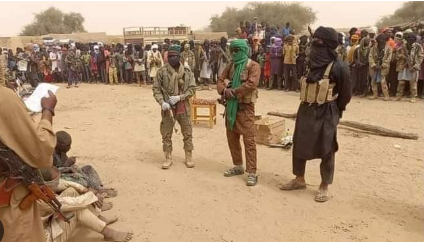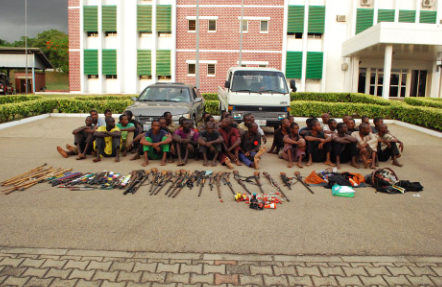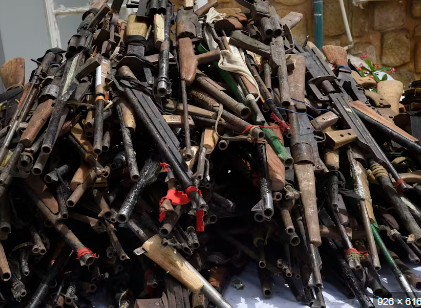[By Idowu Faleye: +2348132100608]
In recent years, the security landscape in Southern Nigeria has become increasingly alarming, with a growing trend of violence perpetrated by the Fulani militia. Often disguised as herdsmen or commercial motorcyclists, these groups have infiltrated Southern communities, from rural farms to bustling urban centres. What was once a relatively peaceful region is now caught in the throes of kidnappings, killings, and the systematic displacement of locals. The very fabric of Southern Nigeria is under siege, and the situation has exposed a glaring weakness: the inaction of Southern leaders and the submission of the people, particularly the Yoruba.
As stories of attacks, kidnappings, and widespread fear continue to dominate the news, the Southern regions face a grave threat—one that appears to have deep historical and political roots. The Fulani militia is said to be driven by an age-old vision of their forefathers, most notably Uthman Dan Fodio, to expand and acquire new territories, particularly in the South. This vision has manifested in violent attempts to take control of land and resources, leaving behind a trail of death, destruction, and sorrow.

With over 29,000 estimated deaths, as stated by Professor Banji Akintoye, a leading Yoruba historian, it is clear that this is not a problem that can be ignored. Yet, Southern leaders seem paralyzed, either by fear, political considerations, or influence from federal structures dominated by Fulani power. This inaction has left Southern communities defenceless, vulnerable to further aggression, and at the mercy of armed militias. Urgent action is needed to protect the Southern region and its people before the situation spirals beyond repair.
To understand the present-day crisis, one must first grasp the historical roots of the Fulani migration. Historically, the Fulani people have lived a nomadic existence, moving across West Africa in search of pasture for their cattle. However, what has often been painted as a benign migration has, in recent years, taken on a more insidious form, particularly in Nigeria. There are claims that this wave of movement into the South is part of a larger mission—one that has its roots in the 19th century when Uthman Dan Fodio led a jihad to expand Fulani influence.
Read Also: The Trend of Insecurity in Nigeria. [Part 2]
This expansionist ideology has not been forgotten. Today, the Fulani militia’s activities, driven by land acquisition and domination, can be seen as a continuation of Dan Fodio’s vision. Under the guise of herding cattle or performing menial jobs, young Fulanis from various parts of West Africa have infiltrated Southern Nigeria. They arrive in large numbers, transported in trailers, ostensibly for employment as commercial motorcycle riders or labourers. However, many of these individuals have been accused of acting as spies, gathering intelligence for future attacks. Numerous arrests in Yorubaland have confirmed these suspicions, yet the threat continues to grow.
The impact of the Fulani militia’s activities on Southern Nigeria has been devastating. What started as sporadic clashes between herdsmen and farmers has escalated into a full-blown crisis that affects both rural and urban communities. Reports of violent attacks, destruction of farms, and mass kidnappings have become all too common.

Southern farmers, particularly in Yorubaland, live in constant fear. Unable to tend to their crops for fear of being attacked, many have abandoned their farmlands, leading to widespread food shortages. Urban communities have not been spared either, as kidnappings have become rampant. Civilians are taken hostage, with their families forced to pay exorbitant ransoms, which are then used to fund further violence.
These attacks often involve heinous acts of rape, with women and girls falling victim to the violence. Entire communities have been displaced, with people fleeing from rural areas to urban centres for safety. Yet, even in the cities, they remain vulnerable.
The systematic kidnapping of civilians for ransom has become a hallmark of the Fulani militia’s operations. These ransoms, in many cases, are used to procure more arms, fuelling an endless cycle of violence. Between 2015 and 2022, Nigeria recorded over 6,000 kidnapping cases, many of them linked to Fulani militants, with total ransoms paid exceeding ₦12 billion (USD 26 million). Despite these staggering figures, the government has failed to take decisive action.
Read Also: The Trend of Insecurity in Nigeria. [Part 1]
Specific cases of attacks in Yoruba land have drawn attention to the scope of the crisis. The estimate of over 29,000 deaths, as highlighted by Professor Banji Akintoye, offers a chilling reminder of how far the violence has spread. Yet, despite this, Southern leadership has remained remarkably passive.
The question that many Southern Nigerians, particularly the Yoruba, are asking is this: Why has there been such inaction in the face of these aggressions? Historically, the Yoruba people are known for their resilience and bravery. From the Oyo Empire to the struggle for independence, the Yoruba have been formidable defenders of their land and people. Yet, today, their response to the Fulani militia’s activities has been largely passive.

Southern leaders, many of whom are embroiled in political alliances, fear reprisal from the federal government, which is heavily influenced by Fulani elites. This political entanglement has made it difficult for these leaders to take strong, decisive action to protect their people.
The fear that a strong response might lead to further violence or a full-scale civil war has paralyzed many leaders. However, this fear has only emboldened the attackers, who interpret inaction as weakness.
With Fulani elites holding significant power in federal structures, including the military and law enforcement, there is a perception that the Southern regions are being systematically disarmed while the Fulani militia remains armed and dangerous.
Read Also: The Undefined System of Government in Nigeria: A Call for True Federalism
One of the most glaring failures in this crisis has been the inability of law enforcement agencies to control the situation. Under the previous Fulani-led government, and even now under a Southern-led administration, the imbalance in how laws on arms possession are applied is stark. Southern civilians are frequently disarmed, while the Fulani militia continues to wield sophisticated weaponry.
Reports of military personnel being overwhelmed by the Fulani militia are common. In many cases, soldiers and police officers stationed in volatile regions have been outgunned or targeted by the militia, further highlighting the government’s inability to protect its people.
In response to the growing threat, the Southwest established a regional security outfit known as Amotekun, designed to protect the Yoruba people from Fulani militia attacks. Initially hailed as a breakthrough, Amotekun has struggled to meet expectations, largely due to federal restrictions from carrying sophisticated weapons needed to combat the heavily armed Fulani Militia and political considerations.

One significant example of the undermining of Amotekun’s effectiveness was the frustrated attempt by Dr. Kayode Fayemi, former governor of Ekiti State, to procure drones for surveillance and security. His efforts were thwarted by existing armament deployment laws that favour the federal government, further highlighting the systemic imbalance that keeps Southern security outfits like Amotekun at a disadvantage.
The dominance of Fulani elites in Nigeria’s federal government has exacerbated the security crisis. Not only has the government failed to curb the activities of the Fulani militia, but it has also allowed the continued disarmament of Southern groups while the Fulani militia remains armed. This political protection of Fulani interests has deepened the security imbalance in the country, leaving the South vulnerable to further attacks.
The toll of the ongoing violence is not just physical but also socio-economic and psychological. Farmers, once the backbone of the Yoruba economy, are abandoning their fields. The resulting food shortages are driving up prices and increasing poverty levels. Traders, too, are struggling, with the constant threat of kidnappings making travel and business dangerous.
The exodus of people from rural to urban areas, driven by fear, is placing immense pressure on cities, leading to overcrowding and strained resources. Beyond the economic costs, the psychological trauma inflicted on Southern communities is immeasurable. The constant fear of attack is eroding the sense of security and peace that once defined these regions.
The ascension of a Yoruba president to power has not eased tensions. Instead, it has placed even more pressure on the Southern regions, with many fearing a backlash from Fulani political power structures, and the ethnic power struggle continues to shape the political landscape.
For Southern Nigeria to reclaim its security and peace, decisive action must be taken. The Yoruba and other Southern leaders must rise to the occasion, taking bold steps to protect their people and their land. Some immediate actions include:
Amotekun and other regional security outfits must be fully equipped and supported to defend against militia attacks. The laws restricting the arming of regional security forces must be revised.
Read Also: Transform Nigerian Local Councils into Agric Development Centres to Enhance Productivity
The time for political games and allegiances is over. Southern leaders must put the security of their people above political considerations and unite to resist Fulani expansionist aggression.
Southern representatives must apply pressure on the federal government to address the imbalance in security and disarmament policies. The federal government must be held accountable for failing to protect the Southern regions and for its implicit support of Fulani militias.
The Fulani militia’s activities in Southern Nigeria represent a grave threat to the future of the region. If Southern leaders continue to stand by and watch, the consequences will be dire—thousands more lives will be lost, and entire communities will be displaced. The Fulani mission to acquire Southern land must be confronted with all the resources at the South’s disposal.
For Southern Nigeria to survive and thrive, it must act now. It is time for Southern leaders to stand firm, protect their people, and reclaim their land from those who seek to destroy it. The legacy of the Yoruba, the Igbo, and all Southern ethnic groups is at stake. The South must rise to this challenge, or risk being erased from history.
References:
Akintoye, B. (2020). A History of the Yoruba People. Dolphin Books.
International Crisis Group. (2018, July 20). Stopping Nigeria’s Spiralling Farmer-Herder Violence. Crisis Group Africa Report N°262.
Amnesty International. (2021, December 16). Nigeria: Government failures fuel escalating conflict between herders and farming communities.
bimbola, A. (2019). The Growth of Fulani Militias in Nigeria and Implications for National Security. Journal of African Studies, 27(4), 45-67.
Human Rights Watch. (2019). Nigeria: New Wave of Violence Leaves Hundreds Dead.
Campbell, J. (2022, March 15). Nigeria’s Insecurity Crisis: Fulani Militias and the Failure of Law Enforcement. Council on Foreign Relations.
Sahara Reporters. (2021, August 9). Fulani Militias Kidnap More Farmers, Displace Thousands in Yoruba Land.
Premium Times. (2020, December 21). Insecurity in Southern Nigeria: How Amotekun Struggles Under Federal Restrictions.
Born in Ekiti State, Nigeria, Idowu Faleye is a Policy Analyst and IBM-certified Data Analyst with an academic background in Public Administration. He’s the Lead Analyst at EphraimHill Data Consult and the Publisher of EphraimHill DataBlog, which posts regular topics on issues of public interest. He can be reached via WhatsApp at +2348132100608 or email at ephraimhill01@gmail.com
© 2024 EphraimHill DC. All rights reserved.This article is the intellectual property of EphraimHill DataBlog. For permission requests, please contact EphraimHill DC at ephraimhill01@gmail.com.










































![The Trend of Insecurity in Nigeria. [Part 2]](https://ephraimhilldc.com/wp-content/uploads/2024/09/Computer-Monitoring-of-Remote-areas.png)



































